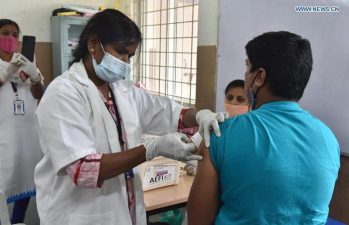
|
The International Monetary Fund (IMF) and financial institutions have shown optimism about the world’s economic outlook as they have said there are many signs of a strong recovery. |
|
The “health” of major economies is expected to improve, but the global economy still faces many difficulties due to the emergence of new SARS-CoV-2 variants. As planned, in early April, the IMF will update its global growth forecast and reevaluate the expected level of 5.5% announced in January. The fund also hailed US President Joe Biden’s proposed US$1.9 trillion rescue package, considering it a key factor to promoting the world’s largest economy. The IMF spokesman Gerry Rice said that the Covid-19 bailout package will boost US GDP growth to 5%-6% in the next three years. This financial package will also support small businesses and extend unemployment benefits until September along with a direct payment of US$1.4 trillion to American citizens. The United Nations Conference on Trade and Development (UNCTAD) pointed out that the world economy can grow by 4.7% thanks to a higher US recovery than previously forecast. The adjustment of this forecast is due to the expectation of an increase in American consumer spending as well as the progress of the COVID-19 vaccination programme and the large economic stimulus package. The Chair of the Federal Reserve also said that the recovery momentum of the US economy “seems to be strengthening”. The US economy has grown faster than forecast thanks to unprecedented monetary and financial policy moves issued by the US Congress and the FED, helping businesses withstand pressure amidst the pandemic. The FED forecasts that the US economy should grow by 6.5% in 2021, the highest level since 1984; meanwhile, the unemployment rate would drop to 4.5% by the end of the year. The European Union (EU)’s economy is also forecast to grow again in the second half of 2021 though the recovery momentum is not as steady. According to Vice President of the European Commission Valdis Dombrovskis, the EU needs a fiscal policy to continue supporting its economy over the next two years. Accordingly, the “exit clause”, which permitted savings in the bloc to overcome the impact of the pandemic while ensuring fiscal sustainability, will continue to be in place until 2022. The UK’s economy is also expected to gradually recover, as economic activity is forecast to return to pre-pandemic level late this year after the “misty country” launches its vaccination campaign. In Asia, many Japanese businesses are placing a high level of expectation on the economic recovery. As a result, 76.8% of enterprises have set plans to gradually expand their businesses. The Organisation for Economic Cooperation and Development (OECD) also forecasts that the economic growth rate of the Republic of Korea (ROK) will be 3.3%, higher than the previous forecast. The OECD raised its growth forecast for the ROK thanks to its belief in a positive impact from the US’ economic stimulus package on its major trading partners, including the ROK. However, both the IMF and UNCTAD warned that the complicated development of the pandemic could cause profound damage to the global economy. According to the IMF, policy makers need to be cautious about the dangers of overspending. The pandemic has caused long-lasting consequences, requiring governments to maintain their support of their economies. The world’s economic output was estimated to have reduced by 3.9% in 2020 due to pandemic prevention measures. The epidemic also caused an unprecedented decrease in incomes, especially for people in developing countries. The maintenance of economic bailout packages and the acceleration of vaccination campaigns against COVID-19 were expected to contribute to supporting the global economic recovery. The optimistic signs are from a number of major economies; however, recovery prospects are still assessed as uncertain and uneven. The pandemic crisis has left many economies around the world lagging and it will get worse if there are no measures to reduce inequity in global access to the Covid-19 vaccine. Source: Nhan Dan Online |
